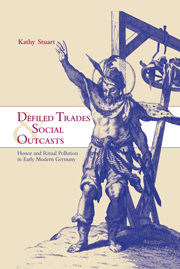Book contents
- Frontmatter
- Contents
- List of illustrations
- Acknowledgments
- List of abbreviations
- Glossary
- Introduction: defiled trades
- PART I THE MEANING OF DISHONOR IN EARLY MODERN SOCIETY
- PART II THE DISHONORABLE MILIEU
- PART III PARADOXICAL DISHONOR: PUNISHMENT AND HEALING
- PART IV ARTISANAL HONOR AND URBAN POLITICS
- 7 Guardians of honor: artisans versus magistrates
- 8 Honor and dishonor in the eighteenth century
- Conclusion: dishonor and the society of orders
- Selected bibliography
- Index
- CAMBRIDGE STUDIES IN EARLY MODERN HISTORY
7 - Guardians of honor: artisans versus magistrates
Published online by Cambridge University Press: 06 August 2009
- Frontmatter
- Contents
- List of illustrations
- Acknowledgments
- List of abbreviations
- Glossary
- Introduction: defiled trades
- PART I THE MEANING OF DISHONOR IN EARLY MODERN SOCIETY
- PART II THE DISHONORABLE MILIEU
- PART III PARADOXICAL DISHONOR: PUNISHMENT AND HEALING
- PART IV ARTISANAL HONOR AND URBAN POLITICS
- 7 Guardians of honor: artisans versus magistrates
- 8 Honor and dishonor in the eighteenth century
- Conclusion: dishonor and the society of orders
- Selected bibliography
- Index
- CAMBRIDGE STUDIES IN EARLY MODERN HISTORY
Summary
Uncompromising guardians of the boundary of honor, artisans pushed the social exclusion of dishonorable people to new extremes in the course of the early modern period. What was at stake for Augsburg's honorable artisans in dishonor conflicts? What did they stand to gain by excluding dishonorable candidates from their guild? What did the authorities stand to lose if the stigma of dishonor spread? We have examined the symbolic logic of pollution and the ambivalent and paradoxical effects of dishonor in the contexts of punishment and healing. Now we turn to the role of dishonor in urban politics and economics, and in the social practices of daily life.
The analysis of the politics of dishonor will proceed on several levels. First we will consider the feasibility of an economic explanation of the phenomenon of dishonor. Were artisans using their stringent honor requirements as a pretext to exclude as many people as possible from their guilds and thus limit economic competition, as many historians have argued? We then survey different types of dishonor conflicts to determine what sets of circumstances tended to trigger dishonor pollution. This typology of conflicts will illustrate that dishonor pollution did not depend on religious sanctions, and that confessional boundaries were not relevant in dishonor conflicts. It will also be shown that dishonor was male-centered. The wives and daughters of defiled tradesmen were less polluting than dishonorable men, and women from the artisan classes were less easily polluted than honorable men.
- Type
- Chapter
- Information
- Defiled Trades and Social OutcastsHonor and Ritual Pollution in Early Modern Germany, pp. 189 - 221Publisher: Cambridge University PressPrint publication year: 2000



